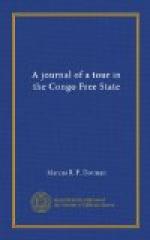After an uneventful and uncomfortable journey through the beautiful part described before, we arrive at Sono Congo about 5 p.m. and take a room in the Magazins-Generaux, a wooden building raised above the level of the ground and fairly clean. It is beautifully fresh and cool up here, and for the first time for half a year, it is possible to take a bath in clear white water.
On again at 6.30 a.m. at which hour it was quite cold, but as the sun rose and we descended, it became very hot indeed, for we were then well south of the Equator and it was summer in the Lower Congo. The scenery through the Palabala mountains improved, if possible, on a second acquaintance and the railway as a feat of engineering, appeared still more marvellous. After a dusty, hot journey, we arrived at Matadi at 5 p.m. and found Mr. de Rache, the Commissaire of the District, on the platform. He had kindly taken a room at one of the hotels, but as it necessitated climbing up the hill and I could only walk with difficulty, I decided to sleep on board the Anversville which was discharging cargo at the pier head. Here indeed were all the luxuries of Europe. A barber, a big bath, white spotless table-cloths, clean shining plate, red juicy beef and last, but by no means least, cold drinks. It is worth roughing it to experience the keen delight at returning to comforts which are never appreciated at their full worth when enjoyed every day.
Next morning we leave Matadi for Boma in the Heron. The current is running down through the narrow channel at about ten knots an hour and the water roars and bubbles as though passing over rocks in a rapid. We therefore roll a good deal and travel very fast indeed until we reach Boma just before midday.
Stories in the Congo grow with extraordinary rapidity and my attack of synovitis had been converted into a serious illness before it reached the capital. A room had therefore, been prepared at the Croix Rouge in which I was soon comfortably installed. The hospital consists of eight sets of rooms arranged in four buildings, separated from each other, but with the verandahs connected by balconies. In the centre is a building in which the eight sisters live the whole thus forming a “t” with a building at each end of the lines and one where they intersect. The whole is situated on a hill from which a magnificent view can be obtained of the river and country around. Here I remained for nearly a week and was attended with much skill and care by the medical men and sisters. It was necessary to make some calls in the town and a carriage at Boma was placed at my disposal similar to the one at Stanleyville, but travelling in it was more comfortable for the roads are better in the capital. It was very hot and the mosquitoes were terribly hostile, but otherwise my visit was very pleasant and agreeable.
On January 6th the German cruiser the Vineta and the gunboat the Habicht entered the Congo and the Governor General gave a dinner to the officers to which I received the honour of an invitation. I am tempted to give the menu to show that although living in the Upper Congo is not good, as a rule, in Boma it is possible to give a banquet worthy of anyone.




